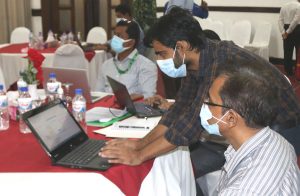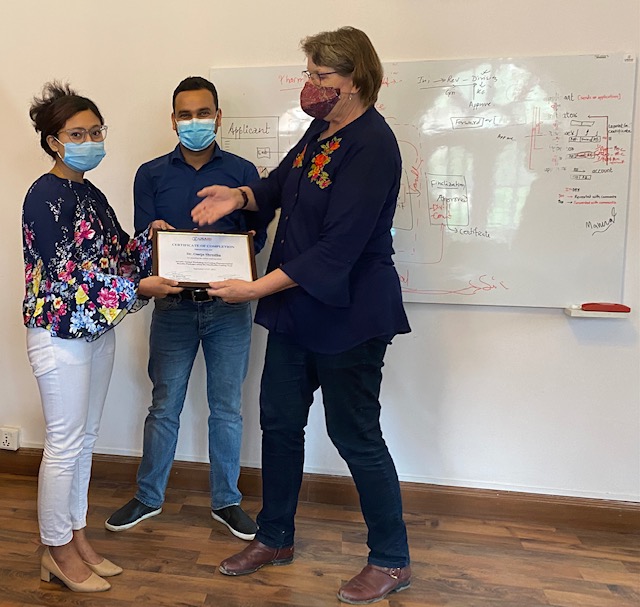Training on Costing Tool Opens Doors to Budget for Pharmaceutical Coverage
The global commitment to reach universal health coverage (UHC) by 2030 promises access to safe, effective, quality-assured essential medicines and vaccines for all people without having to endure financial hardship. Yet, in low- and middle-income countries (LMICs), medicine expenditures account for up to 60% of total health spending, most of which is out-of-pocket payments, aggravating the financial burden on low-income households.
Improving access to quality-assured, affordable medicines for all is a mission of the USAID MTaPS Program. As part of its mission, MTaPS is assisting LMIC governments to address one of the biggest underlying problems that constrain access to medicines—the limited availability of financial resources to provide health coverage. Added to that, issues, such as poor governance and weak regulatory capacity and processes in pharmaceutical management, which typically involves large sums of money, can diminish access to medical products, drive up medicine prices, and waste scarce resources. The solution lies in using evidence-informed systems for prioritizing health commodities for purchase and costing pharmaceutical benefit packages to optimize the use of resources for the best health outcomes for all populations.
Accordingly, in 2020, MTaPS reviewed available costing tools for forecasting spending on pharmaceutical benefits coverage to select the best approach in costing pharmaceutical benefit packages, in support of UHC implementation. The comparative appraisal of the costing tools (published in a report) found that the OneHealth Tool provides a single mechanism for supporting the planning, costing, and budgeting of health sector priorities, including pharmaceutical costs.
To support application of the OneHealth Tool, MTaPS designed and delivered a five-day virtual training to select stakeholders from Bangladesh, Nepal, and the Philippines on how to use it. Led by MTaPS’ consortium partner, Results for Development, the regional training (September 13-19) aimed to build capacity of select government health agency staff, partner organizations, and identified potential consultants in using the OneHealth Tool for pharmaceutical benefit package costing. The training also aimed to develop a pool of resource persons who will support countries in the Asia region as part of overall national health sector strategic planning in countries. The training attendees included 12 from Bangladesh (representing the Health Economics Unit; Institute of Epidemiology, Disease Control and Research; Directorate General of Family Planning; Institute of Public Health Nutrition; and Directorate General of Drug Administration); 6 from Nepal (representing the Department of Drug Administration; National Medicines Laboratory; Department of Health Services; and Health Insurance Board), and 10 from the Philippines (representing PhilHealth and the Disease Prevention and Control Bureau).

Participants in Bangladesh learning about OneHealth Tool for costing pharmaceutical benefits package. Photo credit: Quazi Shahreen Haq

MTaPS Nepal Country Director, Dr. Birna Trap awarding certificate to Dr. Omija Shrestha, Medical Officer-Health Insurance Board, Nepal, for completing the OneHealth Tool training. Photo Credit: Prabin Tamang
Prior virtual training on OneHealth was also delivered to 19 stakeholders from Kyrgyzstan, based on interest scoped with USAID Missions in the Asia region earlier in the year. Missions were oriented on the OneHealth Tool and how it could enable health planners to conduct more evidence-based pharmaceutical planning and budgeting; Missions from Kyrgyzstan, Bangladesh, Nepal, and the Philippines had expressed interest in going forward with the training of government officials.
The OneHealth Tool provides health sector planners with a single framework for scenario analysis, costing, health impact analysis, budgeting, and financing for all major diseases and health system components, which can inform national health sector strategic planning. A robust tool widely in use by countries, it is publicly available for free through the IHP+ website.
In the coming year, MTaPS plans to provide light “help desk” support for an application of the OneHealth Tool to participating country teams and more advanced support in select cases where possible, as part of its objective to assist countries with optimizing financial resources to improve access to essential medicines and health technologies in LMICs.
The pandemic has severely constrained already-limited resources in LMICs by way of divestment in COVID-19 vaccine procurement and treatment of hundreds of thousands of infected patients. The evidence-based prioritization of medical products and costing for pharmaceutical coverage has become more crucial for health sector planning than ever before to maximize health outcomes within the shrunken fiscal space.